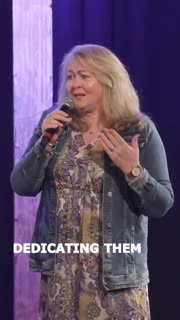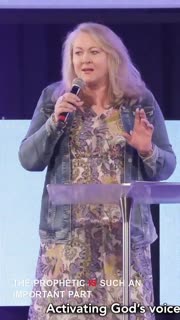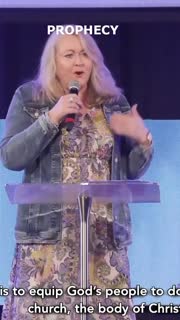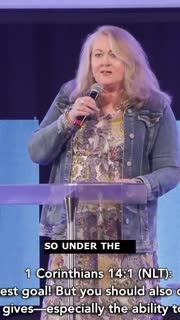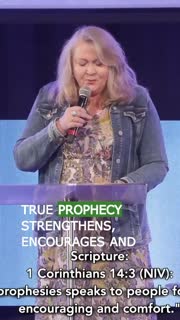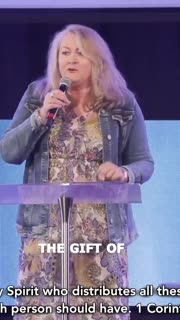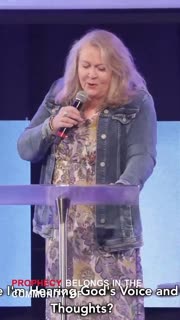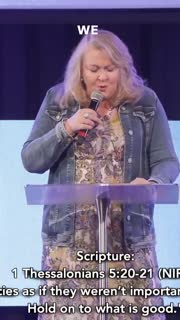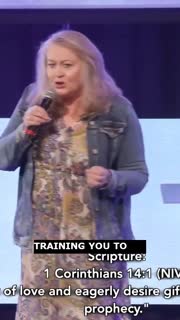Embracing Prophecy: Community, Discernment, and Encouragement
Devotional
Sermon Summary
Bible Study Guide
Sermon Clips
### Quotes for Outreach
1. "We are dedicating them to walk with Him. And we are committing to raising these children Christianly. So that they still need to make their own decision to follow Jesus as the time comes right. But the family are basically saying, we are gonna support them, surround them and give them all the nurture to help them start on that journey and to continue with God in their lives." [55:42] (29 seconds)
2. "The prophetic is such an important part of the Christian life. Now, why do I think that? It's true. It's true. But who doesn't need encouraging, strengthening and comforting? Is there anybody in here that doesn't need that? Man, I for sure need it. And I know that all of you do too." [01:09:04] (25 seconds)
3. "Prophecy remains a valid and essential part of today's Christian life. In 2 Peter it says, And then we go to Corinthians. It says, But when someone prophesies, he speaks to encourage people to build them up and to bring them comfort. So this is a, This is why it's important. Why it's still valid today that we need to be speaking into the encouragement of the body." [01:13:49] (40 seconds)
4. "So under the new covenant, all believers can prophesy. In the Old Testament, before the Holy Spirit was given to us, prophets were ordained, they were set apart, they were anointed to deliver God's Word to the people. But under the new covenant, as introduced in the New Testament, the gift of prophecy is for all believers. Say for all believers. For all. Not just a select few. It is for all. Prophecy is for the encouragement and edification of others." [01:19:34] (38 seconds)
5. "True prophecy strengthens, encourages and comforts. It aligns with God's Word and brings clarity. You should feel encouraged and also release encouragement through prophecy because that is what the Scripture says it will do. Prophecy is calling out the gold in others. It will empower and give hope. Any word that leaves feelings of shame, fear or darkness is likely not from God." [01:27:44] (26 seconds)
### Quotes for Members
1. "I just want to encourage those of you. I feel that there's people in this room. And I just want to start with saying this. There's people who've got a real prophetic gift on their life. But for whatever reason, you've kind of decided to shut it down. And I just want to encourage those of you who are in that category this morning to, in the past, you've been very involved perhaps in bringing words. I just want to say this morning, I believe that God is wanting to reactivate you. And He's wanting to once again say, My call is on your life." [01:10:09] (35 seconds)
2. "The gift of prophecy is a spiritual gift. And the office of a prophet is a spiritual gift. It's actually a grace gift. But God distributes these gifts as He wills. And a prophet in the fivefold ministry will be a trainer and a quipper, recognised and affirmed by the community. So people ask this question all the time. So what's the difference between a prophet and someone who's prophetic? Ever thought, ever wondered about that? Yeah, I have too." [01:17:05] (32 seconds)
3. "Prophecy belongs in the community of faith. And amongst the other fivefold gifts, amongst the council of mature Christians. Now from time to time, I see situations and people go off on a goose chase and they get all excited about things. And this happened to me when I was in Youth With A Mission. And one of the young students decided that they were going to prophesy, this is in 1984, there was 18,000 of us gathered to outreach in LA. And one of the young prophets decided that there was going to be a massive earthquake while we were there and California was going to fall into the sea." [01:23:28] (52 seconds)
4. "We improve by testing and weighing the Word and do not take anything that is of the carnal nature on board. We continue to deepen our relationship with God through prayer and Bible study and actively practising within a community. And this is where a life group is a great place to practise. And I want to challenge all the life group leaders in here. Why don't you create a space sometime in your life group session where you can encourage people to practise prophesying over one another." [01:30:08] (42 seconds)
5. "I'm not training you to be a prophet. I'm training you to be prophetic and to grow in the prophetic. I'm not training you to be on the prayer team, although that might be a result of it. I'm training you to be encouraged to develop the encouragement, the strengthening and the comfort that God says the prophetic is. So, yeah, there's only two spots left really. So it starts this afternoon. It's seven weeks, not consecutive weeks. Starts here, four o'clock, four to six, for seven weeks. Because it's not just about growing in knowledge, it's about growing in understanding." [01:31:40] (41 seconds)
Ask a question about this sermon
1. "We are dedicating them to walk with Him. And we are committing to raising these children Christianly. So that they still need to make their own decision to follow Jesus as the time comes right. But the family are basically saying, we are gonna support them, surround them and give them all the nurture to help them start on that journey and to continue with God in their lives." [55:42] (29 seconds)
2. "The prophetic is such an important part of the Christian life. Now, why do I think that? It's true. It's true. But who doesn't need encouraging, strengthening and comforting? Is there anybody in here that doesn't need that? Man, I for sure need it. And I know that all of you do too." [01:09:04] (25 seconds)
3. "Prophecy remains a valid and essential part of today's Christian life. In 2 Peter it says, And then we go to Corinthians. It says, But when someone prophesies, he speaks to encourage people to build them up and to bring them comfort. So this is a, This is why it's important. Why it's still valid today that we need to be speaking into the encouragement of the body." [01:13:49] (40 seconds)
4. "So under the new covenant, all believers can prophesy. In the Old Testament, before the Holy Spirit was given to us, prophets were ordained, they were set apart, they were anointed to deliver God's Word to the people. But under the new covenant, as introduced in the New Testament, the gift of prophecy is for all believers. Say for all believers. For all. Not just a select few. It is for all. Prophecy is for the encouragement and edification of others." [01:19:34] (38 seconds)
5. "True prophecy strengthens, encourages and comforts. It aligns with God's Word and brings clarity. You should feel encouraged and also release encouragement through prophecy because that is what the Scripture says it will do. Prophecy is calling out the gold in others. It will empower and give hope. Any word that leaves feelings of shame, fear or darkness is likely not from God." [01:27:44] (26 seconds)
### Quotes for Members
1. "I just want to encourage those of you. I feel that there's people in this room. And I just want to start with saying this. There's people who've got a real prophetic gift on their life. But for whatever reason, you've kind of decided to shut it down. And I just want to encourage those of you who are in that category this morning to, in the past, you've been very involved perhaps in bringing words. I just want to say this morning, I believe that God is wanting to reactivate you. And He's wanting to once again say, My call is on your life." [01:10:09] (35 seconds)
2. "The gift of prophecy is a spiritual gift. And the office of a prophet is a spiritual gift. It's actually a grace gift. But God distributes these gifts as He wills. And a prophet in the fivefold ministry will be a trainer and a quipper, recognised and affirmed by the community. So people ask this question all the time. So what's the difference between a prophet and someone who's prophetic? Ever thought, ever wondered about that? Yeah, I have too." [01:17:05] (32 seconds)
3. "Prophecy belongs in the community of faith. And amongst the other fivefold gifts, amongst the council of mature Christians. Now from time to time, I see situations and people go off on a goose chase and they get all excited about things. And this happened to me when I was in Youth With A Mission. And one of the young students decided that they were going to prophesy, this is in 1984, there was 18,000 of us gathered to outreach in LA. And one of the young prophets decided that there was going to be a massive earthquake while we were there and California was going to fall into the sea." [01:23:28] (52 seconds)
4. "We improve by testing and weighing the Word and do not take anything that is of the carnal nature on board. We continue to deepen our relationship with God through prayer and Bible study and actively practising within a community. And this is where a life group is a great place to practise. And I want to challenge all the life group leaders in here. Why don't you create a space sometime in your life group session where you can encourage people to practise prophesying over one another." [01:30:08] (42 seconds)
5. "I'm not training you to be a prophet. I'm training you to be prophetic and to grow in the prophetic. I'm not training you to be on the prayer team, although that might be a result of it. I'm training you to be encouraged to develop the encouragement, the strengthening and the comfort that God says the prophetic is. So, yeah, there's only two spots left really. So it starts this afternoon. It's seven weeks, not consecutive weeks. Starts here, four o'clock, four to six, for seven weeks. Because it's not just about growing in knowledge, it's about growing in understanding." [01:31:40] (41 seconds)
